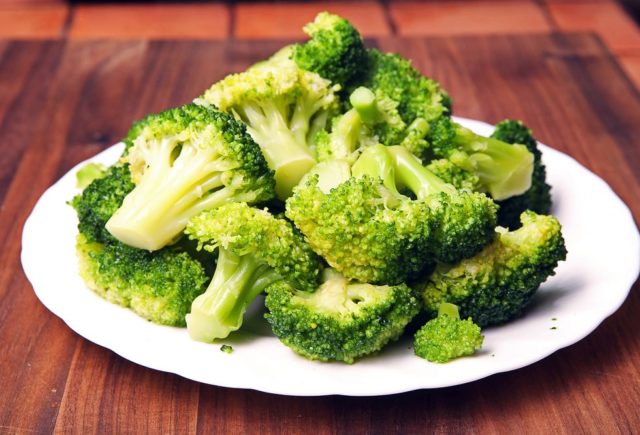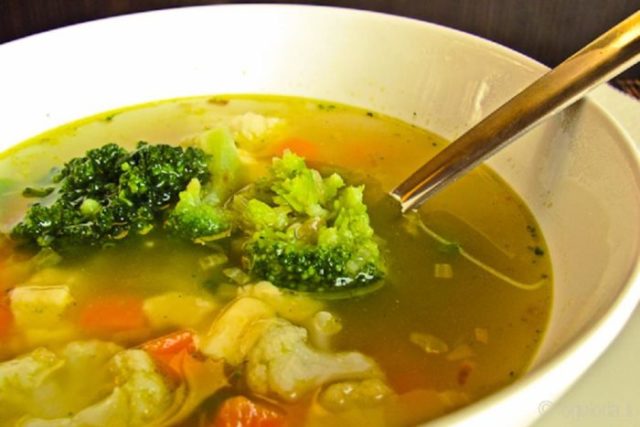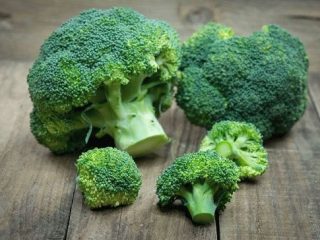Content
The benefits and harms of broccoli depend on your health status and the amount of consumption. In order for the vegetable to benefit the body, you need to study the features and rules for using broccoli.
Chemical composition of broccoli
The unusual green inflorescences of cabbage contain a large amount of useful substances. In particular, the composition contains:
- vitamin K - about 85% of the daily requirement;
- subgroup B vitamins - from B1 to B9, only B12 is missing in cabbage;
- ascorbic acid - almost 100% of the daily value;
- vitamin A and beta-carotene;
- substance choline;
- vitamins E, PP and H;
- silicon - more than 260% of the daily dosage;
- dietary fiber and natural sugars;
- amino acids;
- potassium, phosphorus and manganese;
- iodine, selenium and zinc;
- magnesium and iron;
- calcium;
- fatty acid.
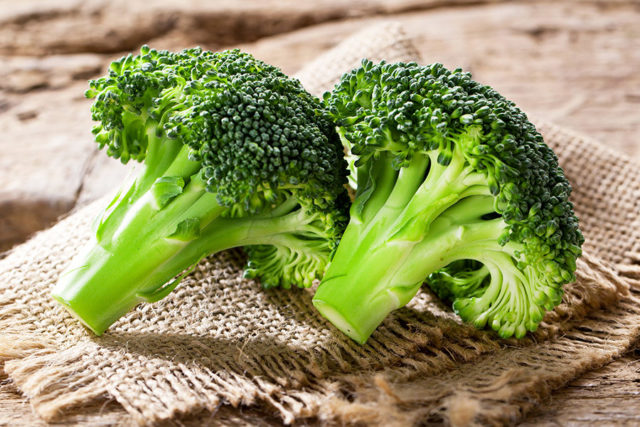
Broccoli contains a lot of ascorbic acid and silicon
Cabbage contains the most carbohydrates - about 4 g in the total volume of the product. Proteins account for 2.8 g, and fats account for only 0.4 g.
The calorie content of fresh cabbage is 34 calories per 100 g. The benefits of broccoli for women in dieting are highly valued; it is impossible to gain extra pounds on the product.
What are the benefits of broccoli for the body?
Thanks to its rich composition, broccoli brings significant benefits to the body. When consumed regularly, cabbage:
- protects the organs of vision from diseases;
- strengthens the walls of blood vessels and has a beneficial effect on the functioning of the heart;
- increases the body's immune resistance;
- helps to cope with colds faster;
- fights inflammatory processes of any nature;
- cleanses tissues and promotes the removal of toxins from the body;
- helps healthy liver function;
- accelerates metabolic processes and prevents constipation;
- can serve as a prevention of cancer.
Not only adult inflorescences, but also seedlings have beneficial properties. The benefits of broccoli seeds are used in detoxification programs, since the sprouts are especially effective in ridding the body of accumulated toxins.
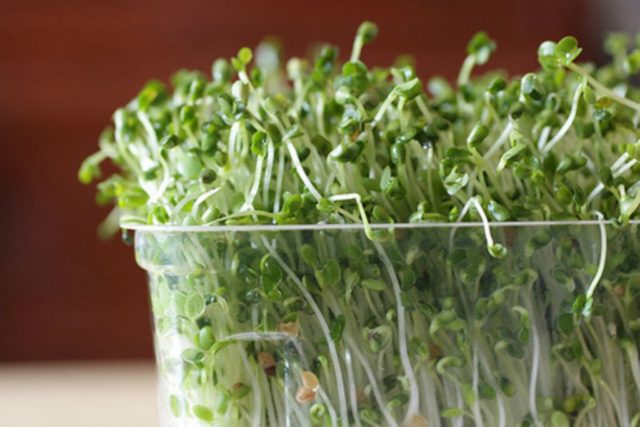
Cabbage sprouts cleanse the body very well
What are the benefits of broccoli for a woman’s body?
Cabbage is present in many diets; it is low in calories, has a pleasant taste and is gentle on the intestines. Women also appreciate the benefits of broccoli for hair - the vitamins and minerals in the inflorescences have a positive effect on the beauty of curls and help maintain youthful skin.
You can eat broccoli during menopause or during painful periods. Cabbage helps normalize hormonal levels and improves general condition.
What are the benefits of broccoli for a man's body?
The anti-cancer properties of inflorescences are especially valuable for the male body. Cabbage, when used regularly, reduces the risk of developing prostate cancer after 40-50 years.
In addition, the product has a good effect on blood vessels and prevents the occurrence of atherosclerosis and heart disease. Cabbage improves blood circulation, which has a beneficial effect not only on the general condition, but also on the potency of a man.
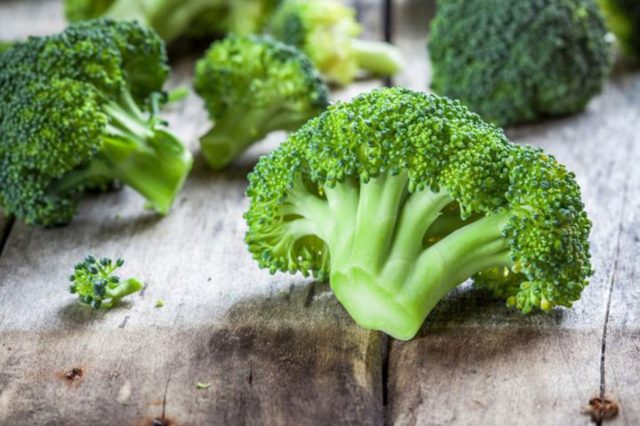
The vegetable's anti-cancer properties are especially beneficial for middle-aged men.
Benefits of broccoli for children
Broccoli is a valuable element of baby food. It very rarely causes allergic reactions, and the benefit is that the inflorescences support healthy peristalsis and prevent childhood constipation.
You can give cabbage to your baby after six months of life in the form of a soft puree. The initial portion should be no more than 1 small spoon; you need to chop pre-boiled cabbage. If there is no negative reaction, then the dosage can be gradually increased.
What form of broccoli is most beneficial?
Cabbage inflorescences can be eaten both fresh and after heat treatment. But the benefits of broccoli will be different.
Is it healthy to eat broccoli raw?
Nutritionists have different opinions regarding fresh cabbage.On the one hand, raw inflorescences retain the maximum amount of vitamins, therefore bringing the greatest health benefits.
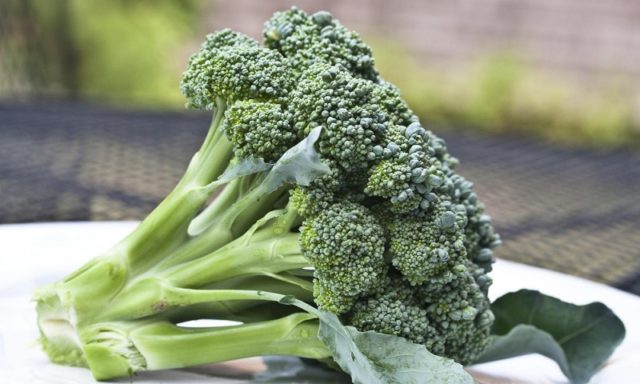
In its raw form, the benefits and harms of the vegetable are ambiguous.
But at the same time, it is raw cabbage that puts the highest load on the stomach and intestines. In excess quantities, inflorescences can cause flatulence and abdominal pain. There is another danger - due to the structural features of the inflorescences, it is very difficult to wash them properly. Therefore, when eating cabbage raw, there is always a risk of contracting an intestinal infection.
Is frozen broccoli healthy?
For long-term storage, cabbage is often frozen - in the freezer it can retain its beneficial properties for up to six months. After freezing, unusual cabbage remains just as healthy; the vitamins and microelements in it are not destroyed by low temperatures. At the same time, it is prohibited to refreeze broccoli; cabbage should be used immediately.
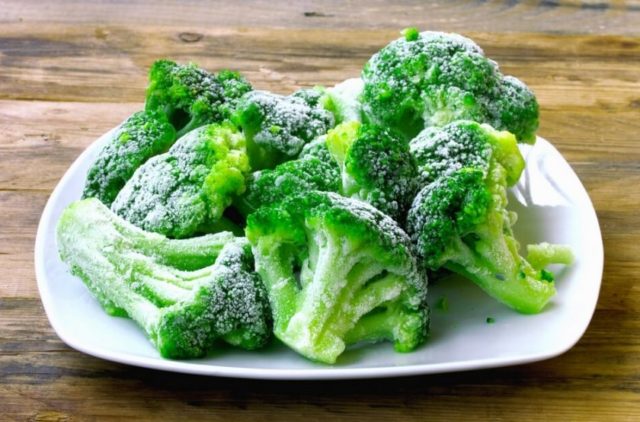
After freezing, the product retains all its properties
Benefits of boiled broccoli
Boiled cabbage inflorescences have a softer structure and are gentle on the digestive tract. When eating boiled cabbage, flatulence and other discomfort in the intestines are less likely to occur. In addition, boiling allows you to properly disinfect the product and eliminate possible E. coli.
The calorie content of boiled cabbage is even lower than that of fresh cabbage - only 28 kcal per 100 g. Therefore, processed inflorescences are often added to the diet.
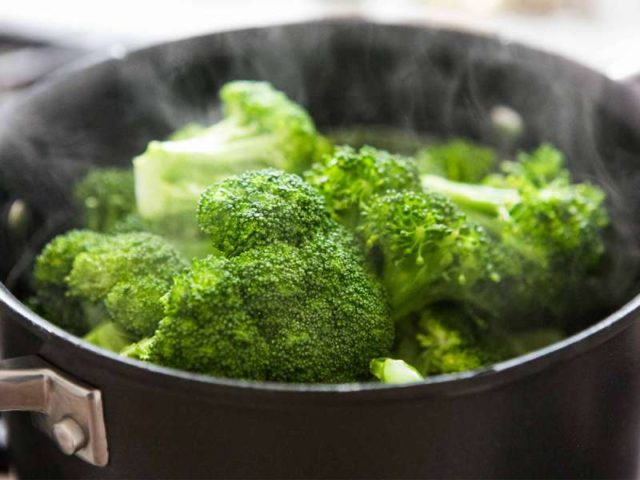
Boiled inflorescences are softer and tastier than fresh ones
Harm of broccoli
Under certain conditions, broccoli can not only be beneficial, but also harm the body:
- The inflorescence will have a negative effect on the intestines during periods of exacerbation of digestive ailments. Broccoli stimulates peristalsis and promotes gas formation, so it should not be consumed if you have diarrhea or flatulence.
- Broccoli can be harmful if the florets are consumed in too large quantities. The recommended daily dosage is only 200 g.
- Like any cabbage, broccoli is not recommended to be eaten at night. Because cabbage florets trigger active digestive processes, it can interfere with night's sleep and lead to abdominal pain and gas.
The benefits of broccoli microgreens, or seeds, will only appear with limited consumption, no more than half a glass of sprouts per day.
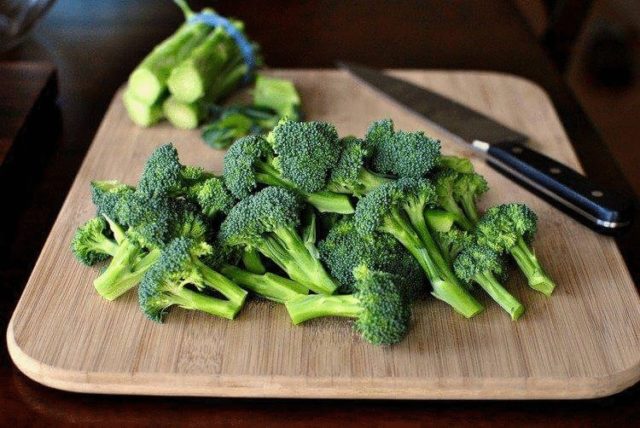
It is not recommended to eat vegetables before bedtime.
Contraindications for broccoli
For certain ailments, it is recommended to completely remove green cabbage inflorescences from the menu. The list of contraindications includes:
- allergy to the product;
- acute pancreatitis or stomach ulcer;
- gastritis with high acidity in the acute phase;
- tendency to diarrhea and gas formation.
It is not recommended to consume cabbage inflorescences during the postoperative period. If the intervention was performed on the abdominal cavity, increased peristalsis can be harmful.
Rules for eating broccoli
In cooking, broccoli is used mainly in processed form. Raw cabbage is quite healthy, but it is difficult to rinse it properly, and besides, a slight bitterness remains in the taste:
- Most often, broccoli is boiled over medium heat for 3-5 minutes.At the same time, the cabbage retains maximum benefits, the bitterness goes away, and the inflorescences become soft in consistency.
In cooking, the product is used mainly in boiled form.
- After boiling the cabbage, you can lightly fry it. The inflorescences are placed in a frying pan with a small amount of oil and kept for just a couple of minutes. When serving, the inflorescences can be sprinkled with cheese or sprinkled with lemon juice, garnished with herbs, nuts or raisins.
Very tasty dish - fried broccoli
- The benefits and harms of broccoli soup depend on the method of preparation. It is recommended to add cabbage inflorescences to first courses in a ready-made, processed form. The fact is that the broth from vegetable inflorescences contains substances adenine and guanine, which can harm the body.
It is better to add broccoli to soup already boiled.
Cabbage is not only boiled, but also steamed, stewed and baked. In all cases, temperature treatment is required very short - no longer than 5 minutes. Cabbage inflorescences go well with most foods - cheese, eggs, meat, cream, vegetables and sour cream.
Use of broccoli in folk medicine
Numerous beneficial properties of unusual cabbage make it a valuable medicinal product. Green inflorescences are used to treat many diseases.
Broccoli for diabetes
Cabbage inflorescences contain the valuable substance sulforaphane. It is best known as an anti-cancer component, but sulforaphane also has another beneficial property - the substance reduces blood glucose. You can eat cabbage inflorescences to maintain normal sugar levels.
The glycemic index of cabbage is only 15 units, so broccoli is almost always allowed for diabetes. Consume it boiled no more than 200 g per day.
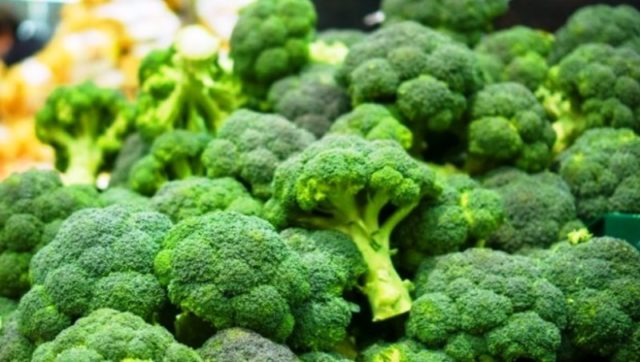
The vegetable is used to normalize sugar levels in diabetes
For the intestines
Cabbage inflorescences contain a large amount of fiber. Eating boiled broccoli is very useful for constipation - the product enhances peristalsis and helps normalize stool.
To get rid of problems with bowel movements, it is enough to introduce vegetable inflorescences into your diet on a weekly basis. For constipation, cabbage has a mild but powerful effect, usually already on the second day, and with regular use of the inflorescences, problems with stool disappear.
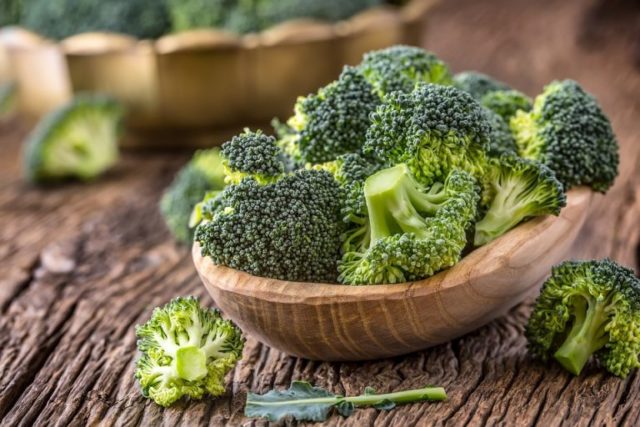
The product helps relieve constipation
For gout
Unlike other types of cabbage, broccoli contains very few purines in its composition and is therefore allowed to be consumed for gout. When using the vegetable, uric acid does not accumulate in the joints; on the contrary, unusual cabbage helps remove harmful salts from the body and alleviate the condition. The inflorescences are used for medicinal purposes after a short boil; broccoli juice is also beneficial; you can drink it in the amount of 1-2 glasses a day.
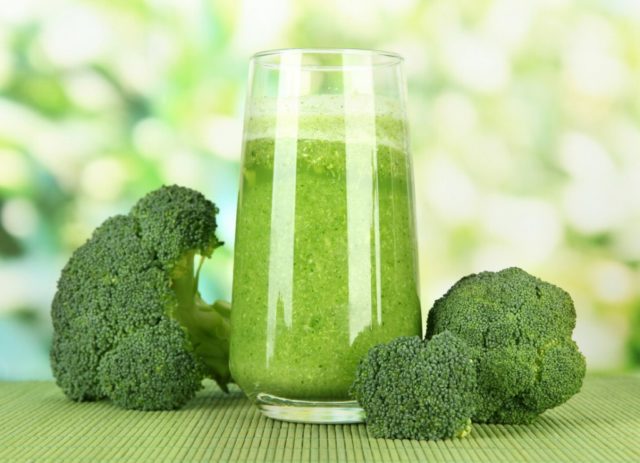
Broccoli florets and juice can be consumed for gout
For the liver
Broccoli can be used to treat liver diseases. The beneficial properties of cabbage inflorescences prevent the deposition of excess fat and improve the digestibility of incoming food. Broccoli removes toxins from the body and thereby facilitates the functioning of the liver, promoting its recovery.
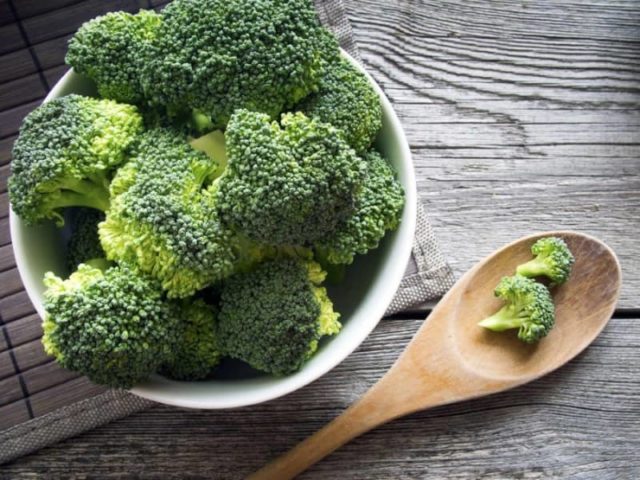
The product helps cleanse the liver of harmful substances
For hemorrhoids
This unpleasant disease occurs mainly due to lack of mobility and poor nutrition. In the treatment of hemorrhoids, not only medications, but also diet play an important role. The food should be rich in dietary fiber and fairly soft - under these conditions, bowel movements will occur easily and hemorrhoids will recede.
Broccoli inflorescences contain a lot of fiber, and the structure of the vegetable after boiling is very soft and easy to digest. Therefore, it is simply necessary to include inflorescences in the diet for hemorrhoids; the product has a therapeutic effect. In addition, the vitamins and microelements of broccoli improve blood composition and strengthen the walls of blood vessels, which also helps to cure hemorrhoids.
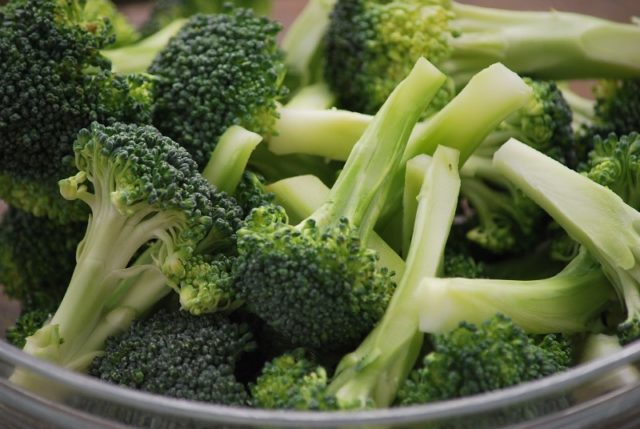
For hemorrhoids, it is very useful to include vegetables in your diet.
Can pregnant women eat broccoli?
Cabbage inflorescences contain many B vitamins, so the product is highly recommended for use during pregnancy. Folic acid in inflorescences has a positive effect on the fetus and promotes the proper formation of the baby’s nervous system. Ascorbic acid in the vegetable strengthens the immune system of a pregnant woman and protects her from viruses and colds.
Broccoli during pregnancy rarely causes nausea, and in later stages it helps fight constipation. Before eating, cabbage must be boiled - fresh inflorescences can be poisoned in unfortunate circumstances, and boiled cabbage is better absorbed by the body.
When breastfeeding, you can return the product to the diet as early as 5 weeks after birth. The product rarely causes negative reactions in infants.
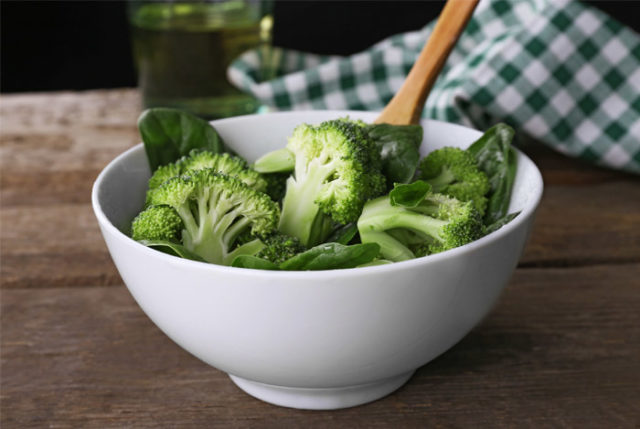
The product helps pregnant women avoid constipation
Conclusion
The benefits and harms of broccoli are closely related to each other. In order for cabbage inflorescences to have a beneficial effect on the body, they must be consumed in small dosages and after proper processing.
